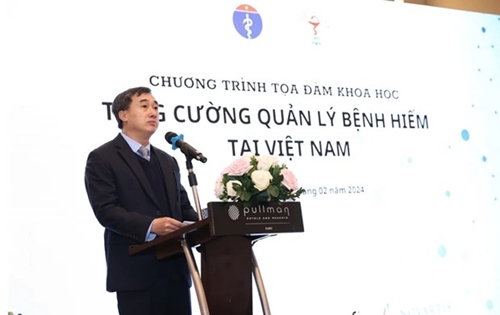Of the rare diseases in the Southeast Asian nation, 58% are found among children, of whom 30% die before they reach the age of five.
    |
 |
|
Deputy Minister of Health Tran Van Thuan speaks at the symposium held in Hanoi on February 29. |
Statistics also showed that 300 million people around the world are living with one of 6,000 identified rare diseases, of which only 5% have a Food and Drug Administration (FDA)-approved drug.
Besides, treatment costs for the rare diseases remain high and unaffordable to most of the patients, if there is no financial support from the state or organizations and the society, especially for prolonged treatment.
In Vietnam, patients find it hard to access treatment methods due to restricted health insurance coverage for the rare diseases, and some drugs yet to be approved in the country.
Deputy Minister of Health Tran Van Thuan said the Ministry of Health has put in place a number of policies and solutions to better manage the rare diseases. These include forming a task force in 2014, establishing an advisory council on rare disease management, and participating relevant forums within the Asia-Pacific Economic Cooperation (APEC) forum and the World Health Organization (WHO).
To deal with challenges to rare disease treatment and management, he suggested the engagement of the entire political system and society, which has proved effective in many countries in the world.
Apart from policy-making, the enforcement of policies plays a crucial role, requiring diverse resources, including international cooperation, the official said, speaking highly of the support from international organizations and pharmaceutical firms like Takeda, Sanofi, Novartis and Roche over the past time.
On this occasion, the Department of Medical Service Administration under the Ministry of Health signed a memorandum of understanding on cooperation with the four pharmaceutical firms, aiming to improve the quality of rare disease management and treatment in Vietnam.
Under the MoU, the relevant sides will establish a group of experts to supervise guideline implementation at hospitals, coordinate to review and update the ministry’s standard treatment guidelines, devise drug management policies, and support the building of national database on drugs for rare diseases, among other activities.
Source: VNA